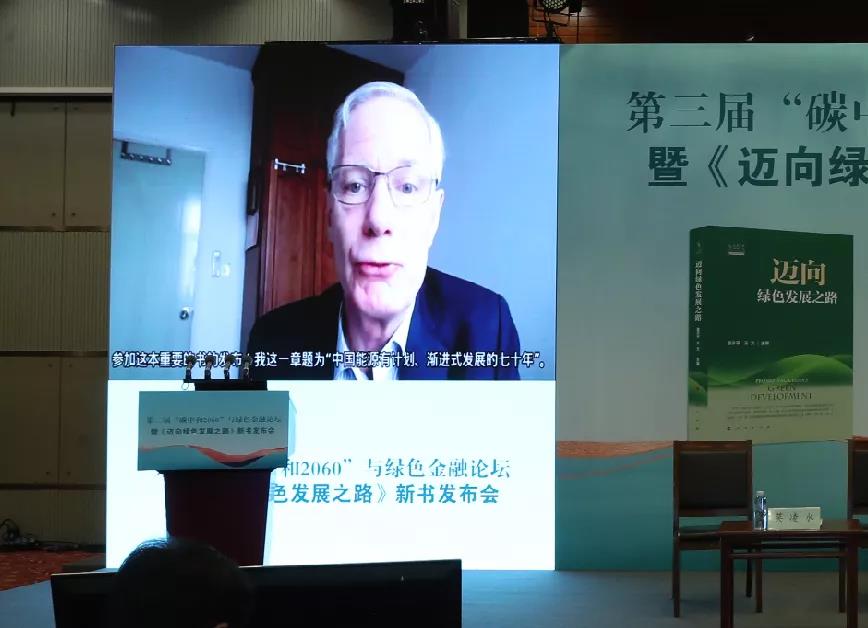发布时间:2021-07-16 作者: 菲利普•安德鲁斯•斯皮德
021年6月21日,中国人民大学生态金融研究中心承办的第三届“碳中和2060”与绿色金融论坛在中国人民大学隆重召开。会上发布了由亚洲开发银行能源部与人大重阳共同策划完成的《迈向绿色发展之路》图书。
编者按:2021年6月21日,中国人民大学生态金融研究中心承办的第三届“碳中和2060”与绿色金融论坛在中国人民大学隆重召开。会上发布了由亚洲开发银行能源部与人大重阳共同策划完成的《迈向绿色发展之路》图书。逾30万观众在线上参与了会议。新加坡国立大学能源研究所首席研究员菲利普·安德鲁斯·斯皮德以线上形式参与了研讨。以下为发言实录:
视频时长3分44秒,以下为发言全文:
女士们、先生们,下午好!我第一次参加这本书的策划会议是在两年半前,很高兴再次见面参加这本重要的书的发布!我这一章题为“中国能源有计划、渐进式发展的七十年”。今天我希望强调两个部分,也是两个关切:第一部分重申本章末尾所表达的关切;第二个部分提到的关切是新的但非常相关。
首先政府正在持续推进能源行业的市场化改革,尤其是电力、天然气和碳排放领域。我所担心的是负责能源生产、转化和运输的公司基本上都是国有企业,无论是在中央还是在地方层面,有国有独资的也有国有控股的,能源密集型企业也是类似的情况。这些国有企业面临着软预算约束,而且往往与政府和机构有着非常密切的关系。我认为,这些特征可能会继续削弱市场的有效性,并将限制市场机制发挥的作用,比如在提高经济效率、价格机制或减少碳排放等方面。
我的第二个担忧也是相关的,但最近才出现,就是过去18个月左右发布的政策文件和声明,综合起来看,揭示了不同政策和目标之间的一些冲突,例如经济增长与低碳目标之间。具体举以下三个例子:第一,一年多前启动的经济复苏计划导致工业和基础设施活动大幅增加,导致了煤炭需求快速增长和排放的增加,这种局面什么时候才能扭转,又如何实现到2035年经济总量翻一番的承诺?第二个例子涉及到能源安全的新战略,在国内生产更多的能源是否意味着生产更多的煤炭、石油和天然气?这会为国有石油公司带来压力,因为受到地质条件限制,如果生产所提到的一部分石油和天然气,经济性并不好,很难有可观收益,然而与此同时,政府正向所有国有企业施加压力,要求其提高盈利能力,因此这体现了政策的冲突,就是强调国有企业的核心作用的同时,又要推动市场化改革。第三,政府还提出国有企业应该在创新驱动低碳发展中发挥重要作用,我认为问题是国有企业一般创新能力都不足,所以也是政策冲突的地方。
作为一个局外人, 我认为这些都是重要的问题,但我也期待看到能源行业的第十四个五年规划以及中长期规划的出台,以协调和解决这些政策上的冲突。非常感谢邀请我参加今天的会议!
以下为发言英文版

Good afternoon ladies and gentlemen! It is great to be with you virtually again two and a half years on from the initial meeting we had, for the launch of this important book. My chapter was entitled “seventy years of energy sector development in the People's Republic of China” calculated incrementalism.
Today I shall make just two parts: the first reiterates a concern that I expressed at the end of the chapter that I wrote; the second concern is new, but it's related.
The first relates to the government's ongoing steps to push forward introducing further market mechanisms into the energy sector, notably electricity, gas and carbon emissions. The concern that I have arises from the fact that companies involved in the production, transformation and transmission of energy are largely state owned at local or central government levels either wholly owned or partially owned, as is the same with energy intensive users, so these state owned enterprises face soft budget constraints and often have very close relationships with governments and agencies. And I think that these features are likely to continue undermining the effectiveness of markets and will constrain the benefits that may accrue from market mechanisms either in terms of economic efficiency in terms of pricing or in terms of reducing carbon emissions.
My second concern is linked but has arisen more recently and that comes from policy documents and statements released over the last eighteen months or so, and taken together they reveal some tensions between different policy objectives, for example economic growth versus low carbon objectives. And we've seen the economic recovery plan launched over a year ago has led to a vast increase in industrial and infrastructure activity that has boosted coal use and emissions, when is this going to turn around, and the pledge to double the economy by 2035.
The other one relates to this call for energy security producing more energy domestically, does this mean producing more coal, oil and gas domestically? That then puts a pressure on the national oil companies because they‘re not going to make a lot of money producing some of this oil and gas because it’s geologically very difficult. And yet at the same time the government is putting pressure on all state owned enterprises to be more commercially viable so there’s another tension there. And again the central role of state owned enterprises that has been reiterated at the same time as pushing markets, also the key role that state owned enterprises should play in innovation that will lead to the low carbon economy.
Again I think it is a problem because the state owned enterprises in general have not proved that innovative. So these tensions are there, they appear at least as an outsider to be important, but I look forward to seeing the fourteenth five year plan for energy and the longer term plans to understand how these tensions will be reconciled. Thank you very much indeed for having me today.
(欢迎关注人大重阳新浪微博:@人大重阳 ;微信公众号:rdcy2013)